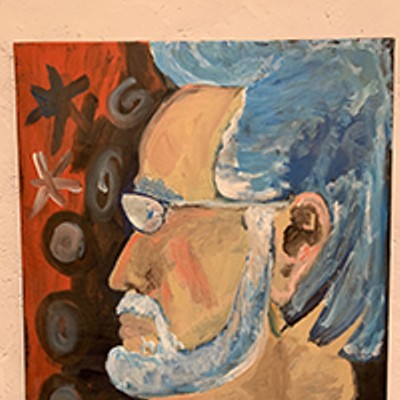The weather in Tucson has been enough to make any sane person giggle with pleasure. (Should deliciously clear, bright days with light breezes be news? Yes. The great poet and weather-freak Wallace Stevens--about whom more below--said that there should be appreciative meteorological headlines every day: Flashes about magnificent cloudbanks spotted over Rio or great flights of birds near Sri Lanka. Granted, this was partly due to his living in Hartford, Conn., but still. The weather in Southern Arizona in November has surely been lovely enough to be in the world's newspapers.)
Also on the good news roster: Poetry magazine just hit the jackpot.
It was in The New York Times on November 19. A retiring, would-be poetess named Ruth Lilly, an heir to the Eli Lilly pharmaceutical fortune, died at the age of 87 and left $100 million to the oldest and most respected journal of verse in the U.S., turning it overnight into the Getty Museum, the Harvard University, why, the very Microsoft of poetry.
The story only gets better. It appears that the reason Ms. Lilly made her completely unexpected bequest was the kindness with which editor Joseph Parisi rejected several poems she submitted to the magazine in the 1970s. His handwritten rejection notes must have been poetry themselves, because not only did she not curse the magazine that failed to accept her precious gems--I'm afraid that's the usual reaction--she blessed it. Generosity, good intentions and faithfulness exemplified, all the way around. And, my God, the money.
Since it was founded in 1912 by a quiet Chicagoan named Harriet Monroe, Poetry--as the Times noted--has generally operated on a shoestring. Sometimes there's been as little as $100 in the bank, but the editors have never missed an issue. And, mostly under the auspices of Monroe herself, the magazine has published--and paid--many of the major 20th-century poets in English, including Eliot, Sandburg, Thomas, Frost, Pound, Williams and Ashbery--not to mention the work of one of the giants in my private pantheon, Stevens.
Ruth Lilly didn't make the distinguished list. Like nearly 100 percent of all the verse ever written, her poems, while I'm sure were heartfelt and much worked-over, did not give pleasure. (Or not enough, anyway. "It Must Give Pleasure" is one of Stevens' three dicta for poetry in "Notes Toward a Supreme Fiction.")
We all notice; we all feel; we all think. Most of us would like to be able to say what's inside us in such a way as to move and delight others. Few of us, however, receive the gift of poetic alchemy--"If poetry does not come as naturally as Leaves to a tree it had better not come at all," said John Keats, who died at 25--and fewer still work hard and long enough at the craft of transmutation to be good at it. Stevens didn't hit his stride until he was well into his 30s.
Poetry is hard. Try writing a sonnet--I dare you. Ruth Lilly couldn't make poetry, either, but she tried to help those who can.
Stevens would have dearly loved the story of Poetry's sudden entry into the realms of gold. Monroe published him long before he got famous and the two of them became close friends. And Stevens was a guy who appreciated the value of a dollar. He scandalized middle-class, mortagage-holding, imaginary-leftist academics for all time not only by making a decent living for himself and his family (he was an insurance lawyer), but also by once declaring that "Money is a kind of poetry." Ooh-la-la! Only a dead white male capitalist Schwein would put those two nouns in the same sentence.
Of course, $100 million can't buy a single line that will last--sadly, nothing can do that if it comes not like Leaves, and especially not now, in an age of proudly uneducated creative writing majors. It's wonderful, though, to imagine practical parents advising their children to go where the money is: to the little magazines. Write poetry, son, because there's gold in them thar hills. Get out there, honey, and make something of yourself in blank verse.
And it's just extremely pleasant, on a beautiful November day, to read that selfless love, at long last, has been oh-so-richly rewarded.






